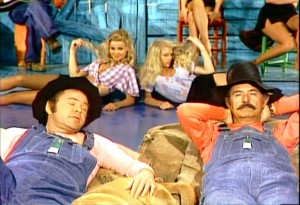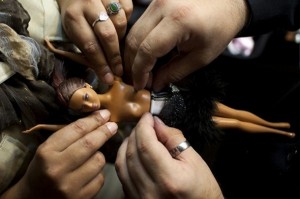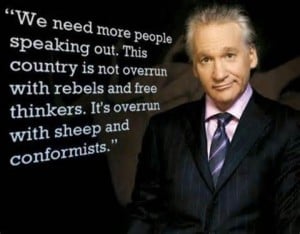The first time I remember it happening to me I was probably six years old, and the bearer of the shocking news was the 1970-80’s television variety hit Hee Haw. Billed a family show brimming with widely popular songs and skits loosely based on rural Southern farm culture, the show at the time was as buzz-worthy and cloud-mind-shaping as Saturday Night Live has been for more recent generations. Hee Haw stands as my first memory of being “told” what it meant to be a woman in the pop-culture-driven world by a ubiquitous-voice-deemed-authority. It came by way of not only its mass media stronghold, but also my family’s rather innocuous tendency to gather ‘round and watch it every Saturday evening.
Co-hosted by beloved country music stars Buck Owens and Roy Clark, the show, to use the description found today in Wikipedia, “was equally well known for its voluptuous, scantily-clad women in stereotypical farmer’s daughter outfits and country-style minidresses.” I recall sitting on the scratchy floral sofa of our enclosed porch quietly absorbing skits in which the famous men of the show basically sexually harassed (as it would be recognized today) the silly-saccharine-sweet, surprised-faced, and good-naturedly-game girls. Their breasts were shoved and pushed teasingly out of their peasant tops and their exposed thighs and frilly bums were skirt-chased through cornfields by rosey-cheeked, aw-shucks good-ol’ boys who always had a joke to make about the lure of the ladies. It was as all-American as apple pie. Sugar and spice…

My impressionable child’s mind, ever watching and listening for adult social cues as to how to behave and what to believe about myself and the world, took solemn note as the men slapped their knees and hooted over the buxom allure and daffy, unquestioned sexual availability of the “Hee Haw Honeys.” They sported such clever names as Nurse Goodbody, an innocently naughty nurse with suggestive innuendo and a stethoscope tucked in her cleavage. The adulation the Honeys received from the men in my world (who, as a child, I naturally wanted to notice and affirm me as a person), not to mention from the media at large, was incredibly seductive. Of course, I did not realize what it amounted to at the time. So these women seemed successful and desirable, women to aspire to because, well why not? The character Misty, famous for her “bedtime stories” on the show, was quoted as saying, “If I could do it again, I’d get a boob job and do Playboy every year. My breasts [could have] gotten me millions.” And everything nice…
By the end of that first episode (and continuing through weekly reinforcement during my childhood) my six-year-old self encountered a harsh realization about what roles women played, who I apparently was (or woefully was not), and the bizarre situation at hand on this planet. I suddenly felt equally enraptured, ashamed, curious, confused, self-conscious, competitive, embarrassed, full of both pained longing and self-loathing. Most of all, I felt sad and angry at this “new development”. Something innate inside my little girl heart and mind sensed this was complete bullshit. But the powerful force of the accepted, profitable ways of the world upon the inexperienced sponge of a mind made Hee Haw’s voice louder — and more important, more authoritative, more believable — than my own fledgling intuition. That’s what little girls are made of.
That first experience of watching women be subjected to, and participate in, such strange behavior was a shock to my little system. Until then, I had been fully aware that I was a girl, but there was no specific meaning, expectation or consequence attached to that, other than the basic anatomy I had learned in 5-year-old pre-school. In the ruminative, contemplative well of a child’s deep internal awareness and inner dialogue of information gathering, assessment and growth — and the in-born confidence of my consciousness as a relatively brand-new human being — I fancied myself the same as boys. I was just as smart, just as athletic, just as competent, just as naturally acceptable and encourage-able, just as serious, important, worthy and full of potential of every kind. Though I obviously could not have described my self-perception in these terms at age 6, I can now as an adult articulate vivid memories of my self-perception as a full and equal human being born with a lot to offer (other than body parts and sexual arousal). Before that I had no reason to think I wouldn’t be valued for those qualities innate to my being, qualities and dreams that I was already innately, intimately invested in by birthright and God’s creativity.

Of course, this happens to both little girls and little boys, and that is equally lamentable (for another blog) but I think most of us will admit it is infinitely more intense for little girls in the face of systemic and profitable sexualization, infantilization, and commodification. Do you remember the first time it happened to you? That you were informed by forces more powerful than you that you were supposedly meant to fulfill a very different and somewhat suspicious purpose than you were actually born for? That you were something other than what you knew yourself to be? That you were up against some dubiously engrained cultural and social narratives that were going to challenge, ruin and possibly even negate everything you originally knew you had to offer? Perhaps it was a seemingly tiny incident in passing, perhaps you only recall it in retrospect. Perhaps you did not understand it at all at the time. Looking back, did it set you on an entirely different path of assumptions, self-reflections, and subsequent actions in your life? Have you honestly fully recovered from it yet? (The more we can all share, the better.)
The whole Hee Haw incident came to mind a few days ago when I was watching the nationally televised BCS Championship football game (I am a huge Alabama fan — Roll Tide!) and listened as long-standing, infamous sports commentator Brent Musburger gushed over the looks of UA quarterback A.J. McCarron’s girlfriend, Katherine Webb, who was in the stands.
Wow, I’m telling you quarterbacks, you always get the good-looking women. What a beautiful woman, wow! If you’re a youngster in Alabama, start getting the football out and throwing in the backyard with pop. Whoa, wow!”
(You really have to watch/listen to get the full effect.)
It was a bizarre moment to be sure as, after cutting to her in the crowd several times (which she clearly noticed on the Jumbotron), he launched into a ridiculous retro assessment of how strapping QBs always “get” the pretty girls, and later the media blasted him for being pervy, voyeuristic and hyper-sexually overzealous (it must be noted he’s made questionable comments about “hot chicks” in football stadiums and on sidelines a few times in the past). I wouldn’t take it that far — I think he also had some dead air to fill — but then I could not figure out exactly why the incident elicited uncomfortable feelings in me. I was first-runner up for Miss Alabama (America) back in the mid-90s (that is a whole other quite embarrassing blog about being guided in directions that are not true to your original self). And so I am all too familiar with the tendency people have to reduce “pageant girls” like Katherine Webb (who is Miss Alabama USA, a similar but markedly different pageant owned by Donald Trump) to an object screaming for commentary on their made-up looks and the surface-level pseudo-qualifications of their boyfriends. Isn’t that what pageant girls sign up for by the very nature of pageants, one might think? There are various opinions on whether it’s fair game, but that’s what happens nonetheless.
Then I realized that Musburger’s moment of gushing over Webb’s physical beauty and pageant queen status on national television — and the aftermath of every television show interviewing Webb about what she thought of the silly incident — was the equivalent of a Hee Haw Honeys moment for thousands of little girls across the country watching that game. Maybe those little girls are athletic, love football or just being with their family around the TV, are great at science and math, or are driven toward unconventional female roles and responsibilities. But in that split second they were told something different about what they are supposed to be made of.
Not because Webb is a pageant girl, but because of Musburger’s authoritative yet antiquated response, they learned what still primarily gets a woman noticed and admired. They learned something about how the world still sadly describes a woman’s prescription for success: being attractive and having snagged the quarterback of a football team. They learned that if you make yourself into the right thing, you are thus so desirable that a grown man on national television with uber-sportscaster-authority during the biggest college football event of the year turns into breathless, excitable, cooing putty in your hot little hands. Ironically while watching a football game, they learned that suddenly the whole world (and the Twitterverse) belonged to a “beauty queen”, despite anything else Katherine Webb might be (and I assume that outside this hullaballoo she is surely much more). But regardless of what we don’t know, the self-perceptions and future concerns and decisions of those young girls will likely never be quite the same. Because of the laser-focus on the man-magnet sexy-factor, suddenly a lot of little girls are questioning the value of what they are uniquely made of, especially if it doesn’t happen to be sugar and spice, but ideas and dreams beyond posing in swimsuits…the image du jour if you Google the coverage of the big game.

Had McCarron’s girlfriend in the stands had a different look, wore little makeup, and had a bio-engineering competition award under her belt instead of a pageant tiara, would Musburger have made resounding exclamations about her that resulted in her booking on every entertainment show in the nation? We all know the likely answer. It’s not an issue of attractive women getting too much attention, it’s the sad state of affairs in 2013 that multitudes of really “wow!”-worthy women are overlooked, undocumented for the public, untapped to be the aspirational women girls desperately want and need to see in our mainstream culture. These women would be thrust into public consciousness for their compassionate acts, incredible business, sports and community accomplishments, intellectual pursuits, activism and the like. And girls are waiting to see these women gushed over by authority figures in popular culture, to see them mean something exciting and not be tucked in hard to find corners. Hell, even the women in our Congress aren’t talked about much in mainstream culture! Let’s give a girl a lifeline!
Maybe I feel so passionately about exposing and highlighting these role models because I’ve been there. I spent years in the past feeling boxed into the package of someone I knew I wasn’t born to be, something untrue to my deepest original self, playing roles that satisfied others and somehow made me generally predictable, palatable, acceptable. It took a brave, long, hard journey of un-peeling it all to get to my current world-view and career, to follow my instincts and put my true self out there, both warts and wins. I don’t want girls to have to spend time un-doing things — there is not time for that in this world! I want girls to be free to unfurl like the most authentic, dignified, and self-propelling flowers from the get-go. Girls say what they are made of.
On Friday, Phil Mushnick wrote in the New York Post (a publication I do not frequent because it exploits and sexualizes everything that breathes, or even things that don’t breathe) arguing that media criticism of Musburger was “unwarranted.” I agree with Mushnick that the unbalanced media often stays dangerously quiet on horrific sexism and sexualization in entertainment and then goes overboard criticizing “less” damaging or threatening people and events. But as you might surmise, I do not agree with Mushnick’s full acquittal of Musburger’s mess as having “said nothing wrong”, rather simply that he was only “reprising a harmless, 90-year-old American folk axiom: The QB gets the pretty girl.” (And nor do I find the squeals of 1935 Popeye cartoon Olive Oyl as an argument that all is well with this nonsensical, evolution-stymying social stereotype in 2013.) For many reasons, like society’s desperate need to get beyond shallowness in finding a mate, and the sore lack of available “Americana” narrative to help foster the LGBT or other minorities’ views and experiences of relationships — but that too is a whole other blog.
In her recent book No Excuses, Nine Ways Women Can Change How We Think About Power, nationally renowned author Gloria Feldt talks about the phenomenon of girls and women gaining the right to equal opportunities in non-traditional aspects of society, but oddly not always taking them, not having the “drive” or “desire” (for lack of better terms) to step into the roles. She cites the example of soccer for young girls, and how that is a sport with increasing openings for not only leadership development and athletic training, but scholarship and professional paths. She tells this story:
There are no limitations so far for Emily, my friend’s 8-year-old soccer ace. When my occasionally impolitic husband, Alex, asked Emily whether she was a tomboy after she came bounding home from winning a game, Emily replied without a trace of self-consciousness: What’s that?
Why is there even still a need for such a term? An active, athletic, driven girl must be a Tomboy…really? I wonder what Emily thought when she learned the definition, how her brain processed and stored that, how it might creep out in the future.
Feldt explains that regardless of legal and social openings to females, self-limitation kicks in as a consequence of repeating stubborn, sticky old social norms (a la Musburger), “particularly those that overemphasize the qualities of niceness, deference, and attractiveness to the opposite sex, individual personality traits, or, more likely, the relationship between the two and how they interact with each other.”
Feldt explains that “as Emily enters adolescence, she’s at risk of becoming a ‘female impersonator,’” a woman who “makes her personality smaller rather than larger” and downplays her formidable or unique skills and abilities, especially when it comes to expectations about how to attract boys. Feldt goes on to say:
Take a girl who has a tendency toward these behaviors and add in those ubiquitous hyper-sexualized female media images she’ll inevitable encounter. It’s easy to see how girls start to relinquish pieces of their power at a very early age and how the cumulative erosion, like water on stone, eventually reshapes the self-assured girl into a young woman who is insecure about her body and her capabilities…
It’s hard to say which girls, including Emily, will become totally separated by such forces from their original self, confidence and innate empowerment, and which will be able to hold onto them despite what they are told or how they are guided. But since we are still in the throes of transitioning to a new paradigm of gender parity, Feldt warns we must constantly ask:
“How can we help ensure Emily makes it through her passage to adulthood with her ego strength intact so she will relate to the world from a place of her own agency rather than reactively molding herself to what she thinks others want?” Because many of us know well, that’s often what grown women are made of.
Both women and men in conspicuous positions of either notoriety or authority must think about this before creating/commentating/orchestrating whatever is their purview in life that girls may consume, from the Hee Haw Honeys to the Musburgers of the world and everything in between. You and I must think about it in our own spheres of influence. Such off-handed incidents may seem trivial and inconsequential, but they are important beyond measure. We often turn out to be made up of what we are told we should be, in ways implicit and explicit. But the gloriously true-to-self and wildly different ways we initially show up on this earth are God’s message to humanity, if only we’ll listen. But first we have to let everyone live and speak their original truth, and to be equally recognized and admired for it. Minds and hearts, goals and smarts, that’s what little girls are made of.
Photo credits:
1. http://www.morethings.com/fan/hee_haw/hee_haw_jailbait1975.htm
2. le-petit-doodler.blogspot.com
3. amusingplanet.com
4. amusingplanet.com
















